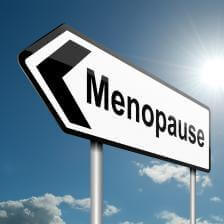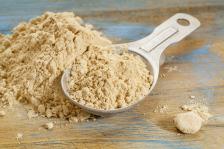What Is Maca and Can It Help with Menopause?
Anecdotes abound, but what does science have to say about maca and menopause? Nutrition Diva dives into ancient Incan tradition to find out more about this potent plant.
Monica Reinagel, MS, LD/N, CNS
Listen
What Is Maca and Can It Help with Menopause?
 Having spent the last two weeks focusing on nutrition and fertility, let’s turn our attention to the other end of a women’s reproductive span. Nutrition Diva listener Betty wants to know:
Having spent the last two weeks focusing on nutrition and fertility, let’s turn our attention to the other end of a women’s reproductive span. Nutrition Diva listener Betty wants to know:
“What is maca and can it really help with menopause?”.
What Is Maca?
Maca is a plant native to the high mountainous regions of Peru and has long been cultivated as both a food and medicinal plant. Maca belongs to the cruciferous family of plants–so it’s a relative of broccoli and Brussels sprouts. But, interestingly, it’s not the leaves, stalks, or flowers of the plant that are of interest. Rather, it’s the part that grows underground.
The fleshy tubers of the maca plant can be cooked in a variety of traditional ways (even brewed into a sort of beer!) and provide some protein, fiber, and minerals along with a fair amount of starch. But most of the maca that is harvested these days is dried and ground into a powder for use as a supplement or herbal medicine. As Betty notes, maca is being promoted as a natural remedy for menopausal symptoms. But maca’s reputation extends to various other aspects of sexual function as well, including male and female fertility and prostate problems. It’s even said to be an aphrodisiac! (More on that later…)

Most of this is based on ancient Incan folk medicine. Traditional herbal medicine, which developed long before the days of the double-blind, placebo controlled experiment, often includes a good bit of superstition, as well as beliefs that have since been disproven. But millenia of observation and trial-and-error have also yielded a lot of wisdom, including remedies that have not only stood the test of time, but have also withstood scientific scrutiny. So, what does the science have to say about maca?
Does Maca help with Menopause?
Maca does not seem to help with hot flashes–but it may have other benefits.
To date, there have only been a handful of controlled experiments looking at the effects of maca on menopause symptoms and each of these involved a relatively small group of women. So far, however, it appears that menopausal women taking maca experience fewer symptoms than women taking a placebo. In particular, it appears to reduce anxiety and depression.
Unfortunately, I didn’t see anything to suggest that maca helps with those pesky hot flashes–which is the symptom that many women find the most troublesome.
Does Maca Improve Fertility?
For those of you who haven’t yet gone through menopause, maca is also said to boost fertility–in both men and women. And the existing research suggests that this may, in fact, be true, especially if you are a mouse or a rainbow trout. There haven’t been any fertility studies involving human women yet. One very small study, involving just 9 human men, found that maca improved sperm count and quality. That’s too small a finding to go to the bank on, but certainly enough to warrant further investigation.
Animal studies also suggest that maca reduces prostate inflammation. Given how common (and uncomfortable) this condition is, I’m surprised that we haven’t yet seen trials to test this effect in human males. Then again, maca appears to reduce prostatic inflammation in mice as effectively as the leading prostate drug…so I can imagine why the pharmaceutical industry is not rushing to fund this line of research!
See also: Can We Trust Industry Funded Research?
Is Maca an Aphrodisiac?
And finally, what about maca as an aphrodisiac?
When researchers gave maca to lab rats, they observed increased sexual activity. As to the effect this may have had on their relationships or quality of life, the rats were, sadly, unavailable for comment.
Exactly how maca might work in the body is still a bit of a mystery but we know that it does not affect hormone levels in men or women.
Studying the effects of alleged aphrodisiacs on humans is more complex. On the one hand, it’s always easy to get volunteers! On the other hand, it can be difficult to interpret the results. Human sexual response involves a complicated mix of physiology, psychology, and social dynamics and it’s pretty hard to control all of those variables. Not to mention the fact that our experience of sexual arousal is very subjective–and quite suggestible. Often, the mere idea that a substance will rev up your libido is enough to do the trick.
A few small studies in humans suggest that taking maca may indeed increase desire and sexual well-being. Not surprisingly, subjects reported improvements in their general well-being as well. Of particular interest was a study that looked at the effect of maca on people taking anti-depressant medications. Reduced sexual desire is a frequent side effect of anti-depressants and subjects who took maca noticed a significant improvement in this problem. Fortunately for the subjects (but unfortunately for science), all of the subjects in this study were given maca, so there was no way to assess how much of the improvement might have been due to placebo effect.
So, how much of maca’s aphrodisiac powers are all in your head? Who cares? To borrow a memorable phrase from Yogi Berra, 90% of sex is half mental!
Is Maca Safe?
There’s nothing wrong with taking advantage of a good placebo response…as long as the substance in question isn’t harmful, And fortunately, maca has a very long history of use and appears to be quite safe. Exactly how maca might work in the body is still a bit of a mystery but we know that it does not affect hormone levels in men or women.
The only potential concern is for folks with thyroid problems. Like other members of the brassica family, raw maca contains nutrients that could suppress thyroid function. As is the case with other foods in this category, this is unlikely to be problem unless your diet is also deficient in iodine. Conveniently enough, maca is a good natural source of iodine–particularly the red, purple, and black varieties of maca.
See also: Are you at Risk of Iodine Deficiency?
So, if you’re curoius about maca, there would appear to be little harm in giving it a try–but I suggest you temper your expectations. My gut instincts tell me that, like many herbal preparations, maca may have some beneficial effects, but they are probably more subtle than the marketing hype would suggest.
Keep in Touch
Thanks to Betty for suggesting today’s topic. If you have a question, comment, or an idea for a future show, post it below or on the Nutrition Diva Facebook page.
Additional Research
Ethnobiology and Ethnopharmacology of Lepidium meyenii (Maca), a Plant from the Peruvian Highlands, Gustavo Gonzales. https://www.ncbi.nlm.nih.gov/pmc/articles/PMC3184420/
Maca powder and menopause images courtesy of Shutterstock.


